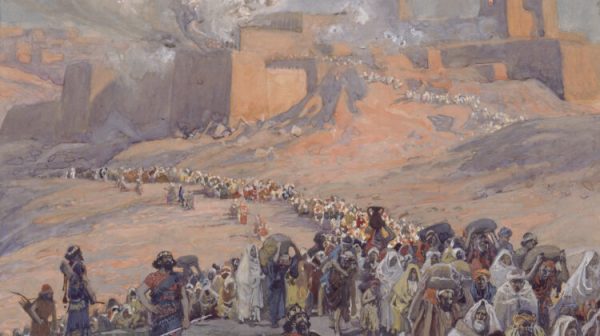Several months ago a landmark Gallup poll found that for the first time in American history, as of 2020 fewer than 50% of Americans belong to a church, synagogue, or mosque. Ever since 1937 when the survey was first conducted, that percentage remained fairly constant at around 70% until the turn of the century, when the number began its plummet all the way down to 47% in only two short decades.
And the pace is only accelerating. While the decline is present in all major subgroups, it is most pronounced amongst Millenials (born 1981-1996): only one in three are members, down 15% in the past decade alone, and only half of those who claim a religious affiliation are members of a religious body. Early data has showed an even more extreme decline amongst Generation Z (born 1997 or later). All signs point to this grievous development being a lasting trend and not a temporary anomaly.
Without question, the decline of Christianity in our society is an unspeakable tragedy. There are now countless thousands of children being born among us who may never hear the Gospel of Jesus Christ preached to them, and who on the contrary are more likely to hear only various slanders and calumnies about the faith He came to this earth to bring.
And yet we also know, according to the witness of this same faith, that the providence of God would not allow this — or any other tragedy whatsoever — to come to pass unless He sees that it can serve to accomplish our salvation… if only we ourselves strive to receive it in a spirit of humility, repentance, and faith. And so we must ask ourselves how we ought to understand and respond to these events in such a way as to become co-laborers with God in turning even this spiritual catastrophe to His glory and to the salvation of souls.
And after all, now more than ever we should need absolutely no further reassurance that the wisdom of God is abundantly able to accomplish this. For what greater apostasy, what more terrible rejection of God has ever occurred in all the history of the world than that of Great and Holy Friday? Yet God, in His mercy, used precisely mankind’s most vile rebellion and most horrifying sin to work for us not only the forgiveness of every transgression, not only the healing of every disease of body and soul, not only the defeat of Death itself, but even our deification and eternal union with Him, raising our fallen nature far above even the holy angels themselves, who never once sinned nor turned themselves away from His glory. Truly incomprehensible is the mercy and loving-kindness of our Savior.
And indeed, the example of the Savior on the Cross must forever and in all things be our own model for living out our Christian life — especially in the midst of temptations and tragedies such as those which now face our nation and our world. When Christ was rejected and crucified by the uncomprehending world, He did not fight against and condemn His torturers and accusers. On the contrary, He made excuses for them and prayed for them: “Father, forgive them; for they know not what they do” (Luke 23:34). And so now when we see the world once again reject and mock the Lord, we ought to restrain our fiery zeal and indignation just as Christ restrained the sword of Peter, and above all we must remember what St. Paul has told us: “we wrestle not against flesh and blood, but against principalities, against powers, against the rulers of the darkness of this world, against spiritual wickedness in high places” (Ephesians 6:12).
The men and women who reject Christ and Christianity, even those who actively fight against and slander Him and His Holy Church… these men and women are not our enemies. On the contrary: they are souls beloved by God, souls for whom Christ died, who have been cruelly and maliciously abused by our true enemies the demons. They are souls for whom we ought to be willing to make any sacrifice and to go to any length to show forth the same love and mercy which the Lord Christ Himself showed to all sinners… “of whom I am chief” (1 Timothy 1:15).
We would do well to recall the words of St. Porphyrios:
“One day you are walking quietly on your way and see your brother walking in front of you, also quietly, when at one point a crook jumps out in front of your brother from a side road and attacks him. He beats him, pulls his hair, wounds him and throws him down bleeding. Faced with a scene like that would you be angry with your brother or would you feel sorry for him?”
I was puzzled by the Elder’s questions and I asked him in turn: “How could I possibly be angry with my wounded brother, who fell victim to the criminal? The thought didn’t even cross my mind. Of course I would feel sorry for him and I would try to help him as much as I could.”
“Well, then,” continued the Elder: ”everyone who insults you, who hurts you, who slanders you, who does you an injustice in anyway whatsoever is a brother of yours who has fallen into the hands of some criminal demon. When you notice that your brother does you an injustice what should you do? You must feel very sorry for him, commiserate with him and entreat God warmly and silently both, to support you in that difficult time of trial, and to have mercy on your brother, who has fallen victim to the evildoer, the demon. Because if you don’t do that, but get angry with him instead, reacting to his attack with a counter attack, then the devil who is already on the nape of your brother’s neck will jump on to yours and dance with the both of you.”
If we Christians treat the unbelievers as our enemies, how will this possibly bring them any closer to Christ? How will they possibly be able to see the Holy Spirit shining within us, the Spirit of God for Whom their hearts truly yearn — though they may not yet realize it?
And indeed, I am convinced that the decline in church membership in our society is by no means entirely the result of a decline in the hunger of the American heart for the Kingdom of God. I have long contended on this blog that modernity is not rejecting Christianity for mere spiritual apathy and hedonism, but for a new religion, an “improved” Christianity (which I have termed Antichristianity), a religion of the man-god rather than the God-man, a religion promising the Kingdom of Heaven right here and now on this earth. Even The Atlantic is now writing stories that sound remarkably similar to this.
But if I am right, if the American heart does indeed still yearn for God, then why is it turning away from Christianity? To be sure, the devil has not been idle in working these many long centuries to distort and to poison the heart of man against the Gospel of Christ. Much of my writing here has been an attempt to understand and counteract such poison.
Yet Christianity has always been slandered; from the very beginning the preaching of the crucified Christ was “unto the Jews a stumblingblock, and unto the Greeks foolishness” (1 Cor. 1:23). The early Christians were even accused by society of being atheists and cannibals, but these and all such accusations were utterly powerless to stop the spread of Christianity even unto the ends of the earth.
So what has changed? Certainly God has not changed, the Gospel has not changed, and the devil is still up to the same old tricks he has been using since the beginning. And though many have lost the likeness, not one single person has lost the image of God in which they were created (though certainly there are those who would prefer that it were not so). It seems, then, that there is but one clear answer: it is we Christians who have changed.
I imagine that few of us need convincing that we are very far from the spiritual stature of our fathers and mothers in the faith. We do not have the fiery zeal of the apostles to proclaim the Word of God. We do not have the joyful longing of the martyrs to give up our very lives for the sake of the Kingdom of Heaven. We do not have the glad and selfless charity of the first Christians who sold every single thing that they owned without taking any thought for their own needs. We do not have the ascetic courage and heroism of the ancient monastics in putting to death the old man and renouncing all that is merely earthly.
And above all, we do not have the all-consuming love for God — and for each and every one of His children — that alone can make any of the rest of the Christian life worth anything.
No, we by and large live comfortable and respectable lives in this world, perhaps going to church on Sundays, perhaps resisting some of the more egregious sins, but otherwise in most ways indistinguishable from the 53% of Americans who no longer see any reason to walk through the doorway of a church. And so if our society which is so obviously thirsting for truth and for holiness cannot find these things in Christianity, we must ask ourselves if this is not because they cannot find these things in us who dare to call ourselves by that most lofty and precious and exalted name.
Yet, as I said earlier, God is extraordinarily merciful and compassionate, and even our worst mistakes and our most terrible sins He can turn toward our spiritual good and our eternal salvation in Him. “But where sin abounded, grace did much more abound” (Romans 5:20). It is precisely by death that Christ has trampled down death.
And so I believe that it has come about by Providence that we are beginning to find ourselves in a situation where it is no longer quite so easy to be a comfortable and respectable Christian in this life. It is no longer quite so easy to imagine that we can have the best of both worlds, that we can enjoy happiness and success and prosperity and respect in this life, and then waltz easily and carelessly into the Kingdom of Heaven in the next. It is no longer quite so easy to forget the sure and certain word of the Lord that “whosoever doth not bear his cross, and come after Me, cannot be My disciple” (Luke 14:27).
Not without good reason has it been said that “the blood of the martyrs is the seed of the Church.” And of course, the word “martyr” simply means “witness.” And whether the time of physical martyrdom is soon approaching once again or not, it nevertheless now seems that the witness of being a Christian is no longer quite so easy for the world to overlook, no longer merely an inevitable part of the cultural backdrop of our society.
And, my brothers and sisters, whether this will turn out to be a great and incomparable blessing for the world, or the cause of immense and unspeakable tragedy, depends entirely on us. If we bury our talent, if we squander the grace with which each of us has been entrusted according to our own measure, if the witness we make to the unbelieving world is one devoid of the love and mercy and compassion of our Lord Jesus Christ, then truly it would be “better for [us] that a millstone were hanged about [our] neck, and [we be] cast into the sea, than that [we] should offend one of these little ones” (Luke 17:2). For “unto whomsoever much is given, of him shall be much required” (Luke 12:48).
But let us not despair over our sins and our failures, let us not be overwhelmed by grief over the times we have forsaken the high calling to which we have been summoned. For the Holy Apostles themselves fled out of fear at the hour of the Lord’s Passion, and even the great St. Peter denied the Savior thrice. Yet none of these sins prevented God on the holy day of Pentecost from sending down upon them the Most Holy Spirit in the form of tongues of fire, and on that same day thousands of souls around them were saved. Even the bloodthirsty persecutor Saul became the greatest preacher of the Gospel of Christ that this world has ever seen.
There is absolutely no more powerful witness on this earth to the Kingdom of Heaven than a life renewed and transfigured by the grace of God. And before God Himself I tell you the truth: such a life, and such great and ineffable grace, is open to each and every one of us, no matter who we are and no matter what we have done. It is open to us through Holy Baptism, through Holy Communion, through the Mystery of Repentance, through a life of prayer and fasting and almsgiving, through a life filled with mercy and compassion and love. And above all: it is open to us through the Cross. So let us strive with all our hearts to say with St. Paul: “I am crucified with Christ: nevertheless I live; yet not I, but Christ liveth in me: and the life which I now live in the flesh I live by the faith of the Son of God, who loved me, and gave himself for me” (Galatians 2:20).
We Christians are once again becoming strangers in a strange land, and “here have we no continuing city, but we seek one to come” (Hebrews 13:14). And truly all the world longs for the city of God… but they will never hear of it if we ourselves do not tell them, and they will never reach it if we ourselves do not lead the way. So let us make the most of this great and holy opportunity which we have been given. Let us make all our lives a witness to the Heavenly Jerusalem. Let us always remember Sion, even as we sing with great and unspeakable grief here by these waters of Babylon.
Let us make it the sole purpose of our lives to bring every single person we meet with us on our journey Home.

















